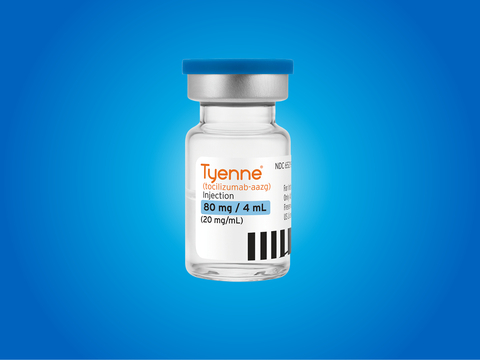Fresenius, via its operating company Fresenius Kabi, announced the immediate U.S. availability of Tyenne®, a biosimilar of Actemra®.
- Tyenne® is the first tocilizumab biosimilar by Fresenius Kabi, an operating company of Fresenius SE, with an intravenous and subcutaneous formulation approved by the FDA.
- The tocilizumab biosimilar provides increased access and an affordable, high-quality, and safe treatment option for U.S. patients.
- Excellent performance of the (Bio)Pharma business in 2024 so far, also driven by Tyenne® which became the first tocilizumab biosimilar available in Europe in November 2023.
- The launch of the tocilizumab biosimilar contributes directly to growing Fresenius’ (Bio)Pharma platform, a substantial cornerstone of the #FutureFresenius strategy.
BAD HOMBURG, Germany--(BUSINESS WIRE)-- Fresenius, via its operating company Fresenius Kabi, announced today the immediate U.S. availability of Tyenne® (tocilizumab-aazg), a biosimilar of Actemra® (tocilizumab). Tyenne®, for use in the treatment of chronic autoimmune diseases, is available in an intravenous (IV) formulation.
This press release features multimedia. View the full release here: https://www.businesswire.com/news/home/20240415467178/en/

Fresenius Kabi announced that Tyenne® (tocilizumab-aazg), a biosimilar of Actemra® (tocilizumab) is now available in the U.S. in an IV presentation. Tyenne tocilizumab-aazg) is for use in the treatment of chronic autoimmune diseases. (Photo: Business Wire)
Michael Sen, CEO of Fresenius: “With the launch of Tyenne® in the U.S., we have reached another important milestone in accelerating our strong (Bio)Pharma momentum. Growing this platform is a substantial cornerstone of our #FutureFresenius journey. Overall, we have seen an excellent performance of our (Bio)Pharma business in 2024 so far. We are particularly happy with the good progress of our majority-owned biotechnology company mAbxience and the traction of Tyenne®, the first tocilizumab biosimilar available in Europe since November 2023.”
Tyenne® is the first tocilizumab biosimilar with an intravenous and subcutaneous formulation approved by the FDA. The biosimilar received FDA approval on March 5, 2024. Tyenne® is Fresenius’ third approved biosimilar available in the U.S. and the second within its immunology portfolio. The biologic medicine is indicated for the treatment of several autoimmune diseases, including rheumatoid arthritis, giant cell arteritis, polyarticular juvenile idiopathic arthritis, and systemic juvenile idiopathic arthritis.
Pierluigi Antonelli, CEO of Fresenius Kabi: “Tyenne® will impact the treatment landscape for inflammatory and immune diseases in the U.S. Reaching ever more patients with our state-of-the-art biopharma portfolio signals a clear growth path in a highly promising market segment. We will continue to roll out our comprehensive pipeline of autoimmune and oncology biosimilars with several molecules in late-stage development.”
Supported by Fresenius Kabi’s support program for health care professionals and patients, the company’s biologic medicine provides wider access to more treatment options and contributes to the viability of health care systems.
Next to its two available biosimilars, Idacio® (adalimumab) and Stimufend® (pegfilgrastim), Fresenius Kabi has a growing pipeline of autoimmune and oncology biosimilars with several molecules in late-stage development.
To learn more about how Fresenius Kabi provides comprehensive patient support for Tyenne® in the U.S. please click here.
With #FutureFresenius, Fresenius successfully set the course last year to become a leading therapy-focused company. In line with the strategy, Fresenius has simplified its structure, is sharpening its focus by concentrating on its operating companies Fresenius Kabi and Fresenius Helios and is continuously enhancing its performance.
About Tyenne®, a Tocilizumab Biosimilar
Tyenne® (tocilizumab-aazg), a biosimilar to Actemra® (tocilizumab), is a prescription medicine called an Interleukin-6 (IL-6) receptor antagonist. It was developed by Fresenius Kabi using advanced analytical and manufacturing technologies for use in the treatment of several autoimmune diseases, including rheumatoid arthritis, giant cell arteritis, polyarticular juvenile idiopathic arthritis, and systemic juvenile idiopathic arthritis. Serious infections leading to hospitalization or death including tuberculosis (TB), bacterial, invasive fungal, viral, and other opportunistic infections have occurred in patients receiving the product. Tyenne is contraindicated in patients with known hypersensitivity to tocilizumab products. For more information about Tyenne, please see the full prescribing information for the U.S. here.
IMPORTANT SAFETY INFORMATION
RISK OF SERIOUS INFECTIONS
Patients treated with TYENNE® (tocilizumab-aazg) are at increased risk for developing serious infections that may lead to hospitalization or death, including tuberculosis (TB), bacterial, invasive fungal, viral, or other opportunistic infections. If a serious infection develops, interrupt TYENNE until the infection is controlled.
Reported infections include:
- Active tuberculosis, which may present with pulmonary or extrapulmonary disease. Patients should be tested for latent tuberculosis before TYENNE use and during therapy. Treatment for latent infection should be initiated prior to TYENNE use.
- Invasive fungal infections, including candidiasis, aspergillosis, and pneumocystis. Patients with invasive fungal infections may present with disseminated, rather than localized, disease.
- Bacterial, viral and other infections due to opportunistic pathogens.
The risks and benefits of treatment with TYENNE should be carefully considered prior to initiating therapy in patients with chronic or recurrent infection.
Patients should be closely monitored for the development of signs and symptoms of infection during and after treatment with TYENNE, including the possible development of tuberculosis in patients who tested negative for latent tuberculosis infection prior to initiating therapy.
CONTRAINDICATION
TYENNE is contraindicated in patients with known hypersensitivity to tocilizumab products.
WARNINGS AND PRECAUTIONS
Gastrointestinal Perforations
Events of gastrointestinal (GI) perforation have been reported in clinical trials, primarily as complications of diverticulitis in patients treated with tocilizumab. Use TYENNE with caution in patients who may be at increased risk for GI perforation. Promptly evaluate patients presenting with new-onset abdominal symptoms for early identification of GI perforation.
Hepatotoxicity
Serious cases of hepatic injury have been observed in patients taking intravenous or subcutaneous tocilizumab products. Some of these cases have resulted in liver transplant or death. Time to onset for cases ranged from months to years after treatment initiation. Most cases presented with marked elevations of transaminases (> 5 times ULN), and some cases presented with signs or symptoms of liver dysfunction and only mildly elevated transaminases.
Treatment with tocilizumab was associated with a higher incidence of transaminase elevations; increased frequency and magnitude of these elevations were observed when tocilizumab was used in combination with potentially hepatotoxic drugs (e.g., methotrexate).
It is not recommended to initiate TYENNE treatment in RA, GCA, PJIA, and SJIA patients with elevated transaminases ALT or AST greater than 1.5x ULN. In patients who develop elevated ALT or AST greater than 5x ULN discontinue TYENNE.
Measure liver tests promptly in patients who report symptoms that may indicate liver injury. If the patient is found to have abnormal liver tests, TYENNE treatment should be interrupted. TYENNE should only be restarted in patients with another explanation for the liver test abnormalities after normalization of the liver tests.
Laboratory Parameters
Laboratory monitoring is recommended due to potential consequences of treatment-related laboratory abnormalities in neutrophils, platelets, lipids, and liver function tests. Dosage modifications may be required.
Neutropenia: Treatment with tocilizumab products was associated with a higher incidence of neutropenia. It is not recommended to initiate TYENNE treatment in RA, GCA, PJIA, and SJIA patients with a low neutrophil count i.e., absolute neutrophil count (ANC) less than 2000 per mm3. In patients who develop an ANC less than 500 per mm3 treatment is not recommended.
Thrombocytopenia: Treatment with tocilizumab products was associated with a reduction in platelet counts. It is not recommended to initiate TYENNE in RA, GCA, PJIA, and SJIA patients with a platelet count below 100,000 per mm3. In patients who develop a platelet count less than 50,000 per mm3, treatment is not recommended.
Elevated Liver Enzymes: It is not recommended to initiate TYENNE treatment in patients with elevated transaminases ALT or AST >1.5x ULN. In patients who develop elevated ALT or AST >5x ULN, treatment is not recommended.
Lipid Abnormalities: Treatment with tocilizumab products was associated with increases in lipid parameters such as total cholesterol, triglycerides, LDL cholesterols, and/or HDL cholesterol.
Immunosuppression
The impact of treatment with tocilizumab products on the development of malignancies is not known, but malignancies were observed in clinical studies with tocilizumab. TYENNE is an immunosuppressant, and treatment with immunosuppressants may result in an increased risk of malignancies.
Hypersensitivity Reactions
Hypersensitivity reactions, including anaphylaxis, have been reported in association with tocilizumab products and anaphylactic events with a fatal outcome have been reported with intravenous infusion of tocilizumab products. TYENNE for intravenous use should only be infused by a healthcare professional with appropriate medical support to manage anaphylaxis. For TYENNE subcutaneous injection, advise patients to seek immediate medical attention if they experience any symptoms of a hypersensitivity reaction. If anaphylaxis or other hypersensitivity reaction occurs, stop administration of TYENNE immediately and discontinue TYENNE permanently. Do not administer TYENNE to patients with known hypersensitivity to tocilizumab products.
Demyelinating Disorders
The impact of treatment with tocilizumab products on demyelinating disorders is not known, but multiple sclerosis and chronic inflammatory demyelinating polyneuropathy were reported rarely in clinical studies. Monitor patients for signs and symptoms of demyelinating disorders. Prescribers should exercise caution in considering the use of TYENNE in patients with preexisting or recent onset demyelinating disorders.
Active Hepatic Disease and Hepatic Impairment
Treatment with TYENNE is not recommended in patients with active hepatic disease or hepatic impairment.
Vaccinations
Avoid use of live vaccines concurrently with TYENNE. No data are available on the secondary transmission of infection from persons receiving live vaccines to patients receiving TYENNE or on the effectiveness of vaccination in patients receiving TYENNE. Patients should be brought up to date on all recommended vaccinations prior to initiation of TYENNE therapy, if possible.
ADVERSE REACTIONS
Most common adverse reactions (incidence of at least 5%): upper respiratory tract infections, nasopharyngitis, headache, hypertension, increased ALT, injection site reactions.
DRUG INTERACTIONS
In GCA patients, no effect of concomitant corticosteroid on tocilizumab exposure was observed.
Cytochrome P450s in the liver are down-regulated by infection and inflammation stimuli including cytokines such as IL-6. Inhibition of IL-6 signaling in RA patients treated with tocilizumab products may restore CYP450 activities to higher levels than those in the absence of tocilizumab products leading to increased metabolism of drugs that are CYP450 substrates.
Exercise caution when coadministering TYENNE with CYP3A4 substrate drugs where decrease in effectiveness is undesirable, e.g., oral contraceptives, lovastatin, atorvastatin, etc.
USE IN PREGNANCY
The limited available data with tocilizumab products in pregnant women are not sufficient to determine whether there is a drug-associated risk for major birth defects and miscarriage.
You may report side effects to the FDA at (800) FDA-1088 or www.fda.gov/medwatch. You may also report side effects to Fresenius Kabi at (800) 551-7176.
Please see additional Important Safety Information in full Prescribing Information, including Boxed Warning.
INDICATIONS
TYENNE is indicated for the treatment of adult patients with moderately to severely active rheumatoid arthritis (RA) who have had an inadequate response to one or more Disease-Modifying Anti-Rheumatic Drugs (DMARDs).
TYENNE is indicated for the treatment of giant cell arteritis (GCA) in adult patients.
TYENNE is indicated for the treatment of active polyarticular juvenile idiopathic arthritis (PJIA) in patients 2 years of age and older.
TYENNE is indicated for the treatment of active systemic juvenile idiopathic arthritis (SJIA) in patients 2 years of age and older.
Tyenne® demonstrates Fresenius Kabi’s commitment to providing access to affordable and cost-effective biosimilars to more patients living with autoimmune diseases around the world while enabling savings for health care systems. KabiCare, Fresenius Kabi’s comprehensive patient support program, will be available to patients and health care providers in the U.S. from launch.
About Fresenius SE
Fresenius SE & Co. KGaA (Frankfurt/Xetra: FRE) is a global healthcare company headquartered in Bad Homburg v. d. Höhe, Germany. In the 2023 fiscal year, Fresenius generated €22.3 billion in annual revenue with its more than 190,000 employees. Fresenius offers solutions to the social challenges posed by a growing and ageing population and the resulting need for affordable, high-quality healthcare. The Fresenius Group comprises the operating companies Fresenius Kabi and Fresenius Helios as well as the investment companies Fresenius Vamed and Fresenius Medical Care. With 140 hospitals and countless outpatient facilities, Fresenius Helios is the leading private hospital operator in Germany and Spain, treating around 26 million patients every year. Fresenius Kabi’s product portfolio includes a range of highly complex biopharmaceuticals, clinical nutrition, medical technology, and generic intravenous drugs. Fresenius was established in 1912 by the Frankfurt pharmacist Dr. Eduard Fresenius. After his death, Else Kröner took over management of the company in 1952. She laid the foundations for a global enterprise that today pursues the goal of improving people’s health. The largest shareholder is the non-profit Else Kröner-Fresenius Foundation, which is dedicated to advancing medical research and supporting humanitarian projects.
For more information visit the company website at www.fresenius.com.
Follow us on social media: www.fresenius.com/socialmedia.
About Fresenius Kabi
Fresenius Kabi is a global healthcare company that specializes in lifesaving medicines and technologies for infusion, transfusion and clinical nutrition. The company’s products and services are used for the therapy and care of critically and chronically ill patients.
Its product portfolio comprises a range of highly complex biopharmaceuticals, clinical nutrition, medical technologies, and I.V. generic drugs. Within biopharmaceuticals, Fresenius Kabi offers, among others, biosimilar drugs with a focus on autoimmune diseases and oncology. The company’s clinical nutrition offering includes a wide selection of enteral and parenteral nutrition products. In the segment of medical technologies, its offering includes vital disposables, infusions pumps, apheresis machines, cell therapy devices, and more. Fresenius Kabi puts essential medicines and technologies in the hands of people who help patients and finds the best answers to the challenges they face.
Following its strategy “Vision 2026”, which is a key part of the #FutureFresenius program of the Fresenius healthcare group, the company is furthermore committed to increase efficiencies in the therapy and care of patients and improve access to high-quality healthcare around the globe. Fresenius Kabi aspires to be leading globally in its product segments – all for the benefit of patients, its customers, and its stakeholders.
Actemra® is a registered trademark of Chugai Seiyaku Kabushiki Kaisha Corp., a member of the Roche Group.
Tyenne® is a registered trademark of Fresenius Kabi Deutschland GmbH.
Idacio® and Stimufend® are registered trademarks of Fresenius Kabi Deutschland GmbH in selected countries.
View source version on businesswire.com: https://www.businesswire.com/news/home/20240415467178/en/
Contacts
Matt Kuhn (847) 220-3033
matt.kuhn@fresenius-kabi.com
Source: Fresenius Kabi
Fresenius Kabi announced that Tyenne® (tocilizumab-aazg), a biosimilar of Actemra® (tocilizumab) is now available in the U.S. in an IV presentation. Tyenne tocilizumab-aazg) is for use in the treatment of chronic autoimmune diseases. (Photo: Business Wire)
View this news release and multimedia online at:
http://www.businesswire.com/news/home/20240415467178/en







